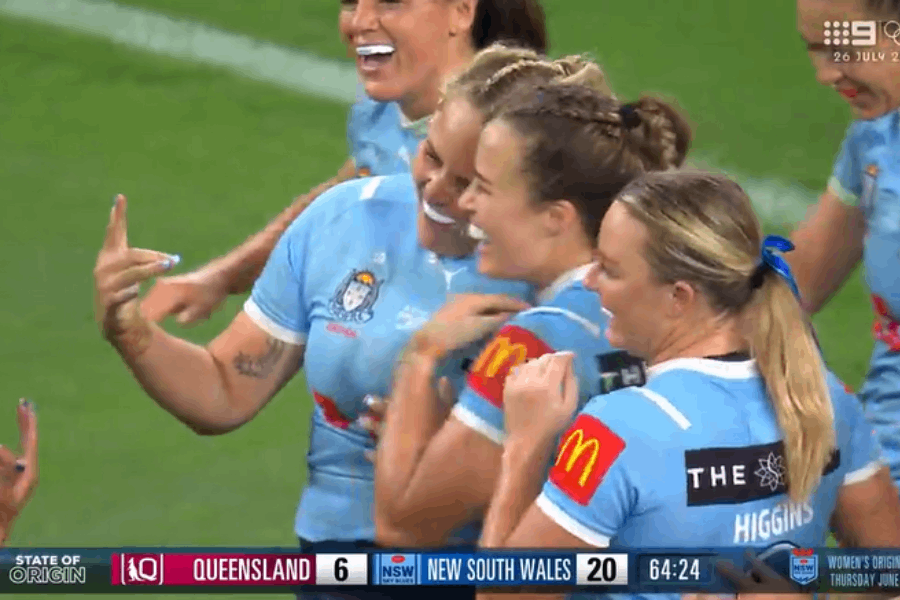When the New South Wales Women’s State of Origin team runs out this upcoming State Of Origin series, something will be missing — and it’s not a key player. It’s their nickname.
The team has been quietly rebranded from the “Sky Blues” to the “NSW Blues Women” after Sydney FC, the A-League soccer club, threatened legal action over the moniker. According to reports, Sydney FC trademarked the nickname “Sky Blues” a decade ago and has repeatedly pressed the NSWRL to drop it from the women’s Origin side since its inception in 2018.
Now, NSWRL has complied — even if the nickname still appears on this year’s jerseys, thanks to kit designs locked in late last year. But the shift raises a broader question: can sporting clubs really trademark nicknames? And if so, where does that leave the many clubs across the world that proudly share the same name?
Nicknames: A Shared Sporting Language
Across codes and continents, teams have long shared nicknames. Just look at the word Blues. It’s been used by the Carlton Football Club (AFL), the NSW State of Origin men’s team, Auckland’s Super Rugby franchise, St. Louis Blues (NHL), and Chelsea FC in the Premier League, just to name a few.
Or the Reds: Liverpool FC, the Queensland Reds, the Cincinnati Reds (MLB), and the now-defunct Melbourne Reds (baseball).
Panthers? Take your pick: Penrith (NRL), Carolina (NFL), Florida (NHL).
Kings? Sydney Kings (NBL), Sacramento Kings (NBA), Los Angeles Kings (NHL).
Jets? Rangers? Giants? Cardinals? The list goes on.
For decades, these coexisting nicknames haven’t been a problem. In most cases, leagues operate in separate regions, separate countries, or separate sporting universes. There’s no confusion because there’s no crossover.
So why did Sydney FC push so hard to protect “Sky Blues”?
The Case of the Sky Blues
Sydney FC has built its identity around the “Sky Blues” name. The club holds a trademark over it in a specific class of goods and services — including entertainment, sporting events, and merchandising. Under Australian trademark law, that gives them the right to challenge other organisations using the name in ways that could be commercially or publicly confusing.
And while it might seem excessive, Sydney FC likely saw potential brand dilution or misassociation, especially with both teams operating in elite-level sport, within the same state, and in overlapping media environments.
But fans of the women’s Origin team have reason to feel shortchanged. The nickname wasn’t new or unusual. It was a nod to the state’s traditional jersey colour and aligned with the NSW men’s “Blues” team identity. Now, it’s been erased — not by rivals on the field, but by a branding technicality.
Sport vs. IP: Where’s the Line?
Trademarking a nickname is not new — and it’s entirely legal. But legal doesn’t always mean reasonable. As clubs increasingly behave like commercial brands, their need to ‘own’ language has collided with long-standing traditions of shared sporting culture.
It’s worth noting that multiple teams holding similar or identical names isn’t usually a legal problem — unless they’re in the same market, with similar services, or causing genuine consumer confusion. That’s the grey area where Sydney FC’s case likely landed.
Could the Queensland Reds stop Liverpool from using “Reds” if both launched merch in Australia? Could Penrith block Carolina’s Panthers-branded caps from hitting shelves here? Technically, only if a trademark exists in the relevant jurisdiction and class, and only if the overlap is meaningful.
In other words, you can share a name — until someone with deeper pockets or sharper lawyers decides you can’t.
When Nicknames Become Legal Battlegrounds
This isn’t the first time a sports organisation has faced legal challenges over naming rights. In 2014, the U.S. Patent and Trademark Office canceled six trademark registrations held by the NFL’s Washington Redskins, ruling that the term “Redskins” was disparaging to Native Americans. This decision intensified public pressure, eventually leading the team to rebrand as the Washington Commanders in 2022.
Similarly, the NHL’s Utah Hockey Club encountered obstacles when attempting to trademark the name “Utah Yeti.” The U.S. Patent and Trademark Office denied the application, citing potential confusion with the existing YETI brand, known for its outdoor products. This setback forced the team to reconsider its branding strategy.
In the realm of soccer, Inter Miami CF, co-owned by David Beckham, faced a trademark dispute with Italy’s Inter Milan over the use of the term “Inter.” Inter Milan argued that “Inter” was synonymous with their club and sought exclusive rights to the name in the U.S. The dispute led to legal proceedings, with Inter Milan initially securing a favourable ruling, though the matter was eventually settled, allowing both clubs to coexist under the shared moniker.
The NHL’s Vegas Golden Knights also found themselves in a naming conflict with the U.S. Army, which has a parachute team known as the “Golden Knights.” The Army filed a notice of opposition to the team’s trademark application, leading to a legal dispute. Eventually, both parties reached a coexistence agreement, permitting the use of the name by both entities.
What’s in a Name?
The rebranding of the NSW Women’s team is a reminder of the growing tension between commercial sport and community identity. A nickname like “Sky Blues” doesn’t just describe a colour. In NSW it is shorthand for pride, tradition, and place.
Stripping it away might be legally sound — but for fans, it feels like a loss that goes beyond logos and licensing.
As sport becomes more corporate, the question remains: who really owns a name — the club, the trademark holder, or the fans who chant it from the stands?








